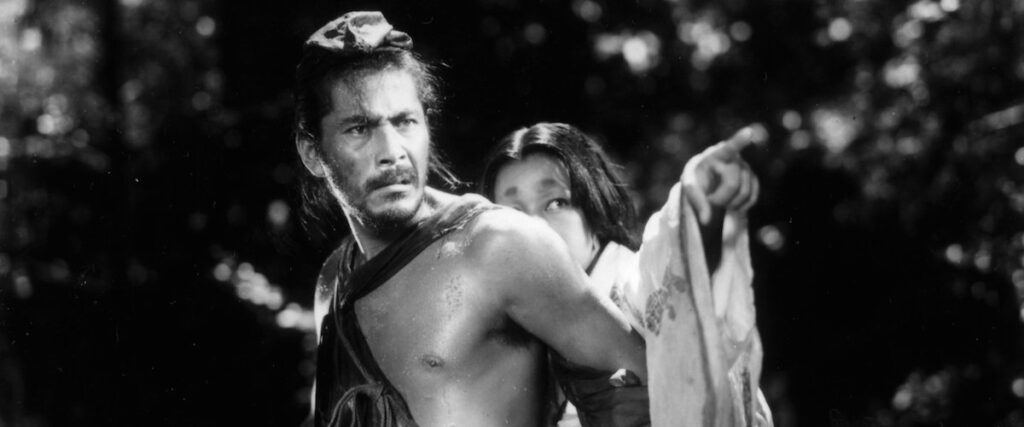Note: If you wish to receive, via e-mail, (1) my weekly newsletter or (2) daily copies of these posts, notify me at [email protected] and indicate which you would like. I promise not to share your e-mail address with anyone. To unsubscribe, send me a follow-up email.
Tuesday
Over the past few months I’ve been reporting on Angus Fletcher’s book Wonderworks: The 25 Most Powerful Inventions in the History of Literature, with each post dedicated to a different “invention.” Today I look at what the Ohio State Professor of Story Science says about “the invention of the second look.” He finds evidence of this invention in Shakespeare’s Julius Caesar but notes that it comes into its own with the Ryūnosuke Akutagawa short story Rashomon, with Akiri Kurosawa adding a further turn of the screw in his film version.
In a literary approach that I have described as anthropological-neurobiological, Fletcher talks about how we are conditioned to believe what our brains tell us. While this works very well for animals, however, eventually
more complex brains emerged. And these brains discovered that there could be advantages to questioning. One of the advantages, rather ironically, was to offer protection from other complex brains. Complex brains could lie and deceive, duping their targets with elaborate fictions. So, over time the complex brain evolved the capacity to skeptically evaluate the things it saw—and judge whether or not those things could be believed.
In other words, to more effectively engage with the world we need a second look. Literature proves powerful ways to develop this look.
Fletcher’s first example is Antony’s famous speech in Julius Caesar. While Antony’s audience begins by thinking of Brutus as an “honorable man,” Antony delivers his speech in such a way that his auditors start questioning this assumption. Here’s an excerpt:
The noble Brutus
Hath told you Caesar was ambitious:
If it were so, it was a grievous fault,
And grievously hath Caesar answer’d it.
Here, under leave of Brutus and the rest–
For Brutus is an honorable man;
So are they all, all honorable men–
Come I to speak in Caesar’s funeral.
He was my friend, faithful and just to me:
But Brutus says he was ambitious;
And Brutus is an honorable man.
He hath brought many captives home to Rome
Whose ransoms did the general coffers fill:
Did this in Caesar seem ambitious?
When that the poor have cried, Caesar hath wept:
Ambition should be made of sterner stuff:
Yet Brutus says he was ambitious;
And Brutus is an honorable man.
By the end of the speech, audience members are asking themselves whether Brutus is, in fact, honorable Fletcher writes,
Antony’s repetition incites this question for a simple reason: it creates a light sensation of déjà vu that makes our brain self-conscious. In that self-conscious state, our brain is pulled out of its passive viewing experience and prompted to take an active second, third, and fourth look at our internalized belief that Brutus is an honorable man. And as our brain goes back and reviews, and re-reviews, and re-re-reviews, we have to decide, and re-decide, and re-re-decide: Do I tag this belief as true or untrue? So a belief that initially slipped inside our head without resistance becomes a repeated object of our conscious judgment.
If you’ve seen Kurosawa’s Rashomon, you know about this re-re-deciding. The film gives us four different accounts of an encounter between a man and his wife’s encounter with a bandit while traveling through the woods. Each appears to be true as we can see it with our own eyes, only to be thrown into question by the next account.
Fletcher says that, by deliberately alienating their audience, Akutagawa and Kurosawa clear our heads so we don’t allow our brains to be taken over by ideas that aren’t our own. “You may be doomed to believe everything you see,” he concludes, “but with fiction…you can take another look.”
Other works that get us to take this second look, he notes, are James Joyce’s Portrait of the Artist as a Young Man, Nella Larsen’s Passing, Bertolt Brecht’s Mother Courage and Her Children, Chinua Achebe’s Things Fall Apart, Kurt Vonnegut’s Slaughterhouse-Five, Philip Roth’s Portnoy’s Complaint, Ama Ata Aidoo’s Our Sister Killjoy, Timothy Mo’s The Redundancy of Courage, and J. M. Coetzee’s Disgrace. In Passing, for instance, we never learn definitively how Clare falls from a window—there are two characters who could have pushed her and she also may have committed suicide—while in Mother Courage we are torn between whether to cheer for or boo the protagonist, who sells provisions to soldiers during the Thirty Years War.
As with all Fletcher’s inventions, the second look enables us to engage much more effectively with the world. Better living through literature, in other words.
